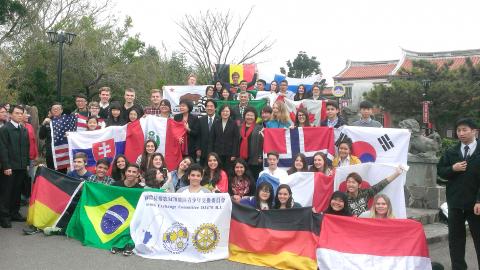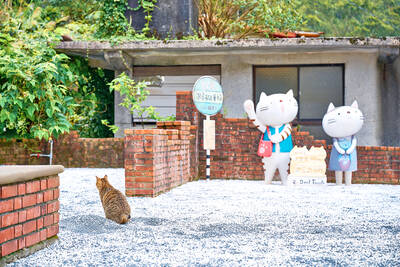Recent years have seen a marked increase in the number of Japanese and South Korean students studying in Taiwan. According to statistics provided by the Ministry of Education, there were 7,548 Japanese students – including degree students, exchange students and other short-term non-degree students – and 4,624 South Korean Students in Taiwan last year. Compared to 2015’s figures, the number of Japanese students increased by 19 percent, while the number of South Korean students grew by 21 percent.
The Ministry of Education attributed the increase in Japanese students in Taiwan to the long-standing friendly ties between the two nations and the recent trend for middle and high schools in Japan to organize overseas field trips. On the other hand, academic exchanges between South Korea and Taiwan have gained impetus since former South Korean president Park Geun-hye received an honorary doctorate from Chinese Culture University having previously studied there. In addition to that, mounting political tension between China and South Korea has made many South Korean students choose Taiwan over China.
Several years ago, Taiwan established education centers in Japan and South Korea to promote and market its Chinese-learning and higher education programs. Tamkang University is responsible for student markets in Japan, while Chinese Culture University is responsible for South Korean markets. There are also scholarships available for exchange students from Japan and South Korea.

Photo: Liu Wan-chun, Liberty Times
照片:自由時報記者劉婉君
(Liberty Times, translated by Tu Yu-an)
近年來,台灣的日本、韓國境外學生人數明顯增加。根據教育部統計,去年日本留學生(含學位生、交換生、短期生等)在台人數達七五四八人,比前一年增加百分之十九;韓國去年留學生有四六二四人,較前一年增加百分之廿一。
教育部分析,台日長年友好,且日本中學盛行教育旅行,讓更多日本學生來台;韓國則因前總統朴槿惠曾在文化大學就讀,並獲頒榮譽博士學位,促成台韓學生交流頻繁,此外,中韓關係緊張,也讓更多韓國學生選擇來台。
台灣多年前已在日、韓成立教育中心,肩負華語推廣與高教行銷任務。日本由淡江大學負責,韓國由文化大學協助。此外,國內也有提供給日韓交換學生的獎學金。
(自由時報記者吳柏軒)

A: There are always adventurers who want to conquer Taipei 101 as a world-class landmark. Didn’t someone once parachute from the top of it? B: Yeah, that’s right. Austrian extreme sportsman Felix Baumgartner once parachuted from the rooftop observation deck in 2007 without permission. He died earlier last year in a powered paragliding crash at the age of 56. A: Hollywood superstar Tom Cruise also almost jumped off Taipei 101 for “Mission Impossible 3.” B: What? But I didn’t see the building in the movie. A: The news says that the film’s producers applied to the Taipei City

People use far more than just spoken language to communicate. Apart from using our voices to pronounce words, we also use body language, which includes countless facial expressions. Most people know that smiles and frowns indicate pleasure and displeasure, or that wide eyes with raised eyebrows typically show surprise. However, there is a lot more to learn about how facial expressions can help or hinder communication. People often unintentionally reveal their emotions through very tiny facial movements known as “microexpressions.” The term was popularized by psychologist Paul Ekman, who found that people from cultures across the world generally recognize

Nestled in the mountain region of northern Taiwan lies a small village that was once bustling due to a thriving coal industry, only to later gain fame for an entirely different reason — cats. This is Houtong Cat Village (猴硐貓村), located in Ruifang District, New Taipei City. Traditional Coal Mining and Village Transformation Houtong was originally known as “Monkey Cave” (houtong, 猴洞), a name derived from the wild monkeys that once inhabited caves in the surrounding hills. During the Japanese colonial period in the early 20th century, rich coal deposits were discovered and developed, rapidly turning Houtong into one of northern Taiwan’s

對話 Dialogue 清清:氣象預報說週末好像有寒流,天氣這麼冷,我只想宅在家裡。 Qīngqīng: Qìxiàng yùbào shuō zhōumò hǎoxiàng yǒu hánliú, tiānqì zhème lěng, wǒ zhǐ xiǎng zhái zài jiālǐ. 華華:說到這個,我週末想約剛認識的新朋友出去玩,但寒流來的話戶外活動可能不太合適,我還不知道要做什麼好。 Huáhua: Shuō dào zhège, wǒ zhōumò xiǎng yuē gāng rènshí de xīn péngyǒu chūqù wán, dàn hánliú lái de huà hùwài huódòng kěnéng bú tài héshì, wǒ hái bù zhīdào yào zuò shénme hǎo. 清清:要不要考慮去玩密室脫逃?我以前跟朋友去過,很好玩,而且不怕風吹雨淋。 Qīngqīng: Yào bú yào kǎolǜ qù wán mìshì tuōtáo? Wǒ yǐqián gēn péngyǒu qù guò, hěn hǎowán, érqiě bú pà fēng chuī yǔ lín. 華華:我覺得不錯,可是我們才剛認識,會不會太尷尬? Huáhua: Wǒ juéde búcuò, kěshì wǒmen cái gāng rènshí, huì bú huì tài gāngà? 清清:不會啦!玩密室脫逃需要大家一起合作,反而更容易變熟。 Qīngqīng: Bú huì la! Wán mìshì tuōtáo xūyào dàjiā yìqǐ hézuò, fǎn’ér gèng róngyì